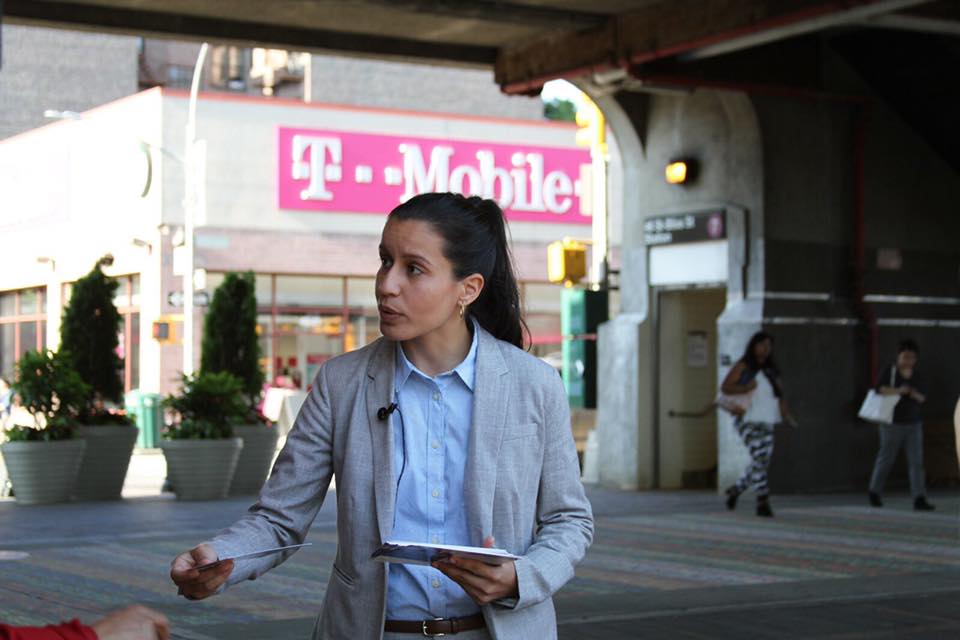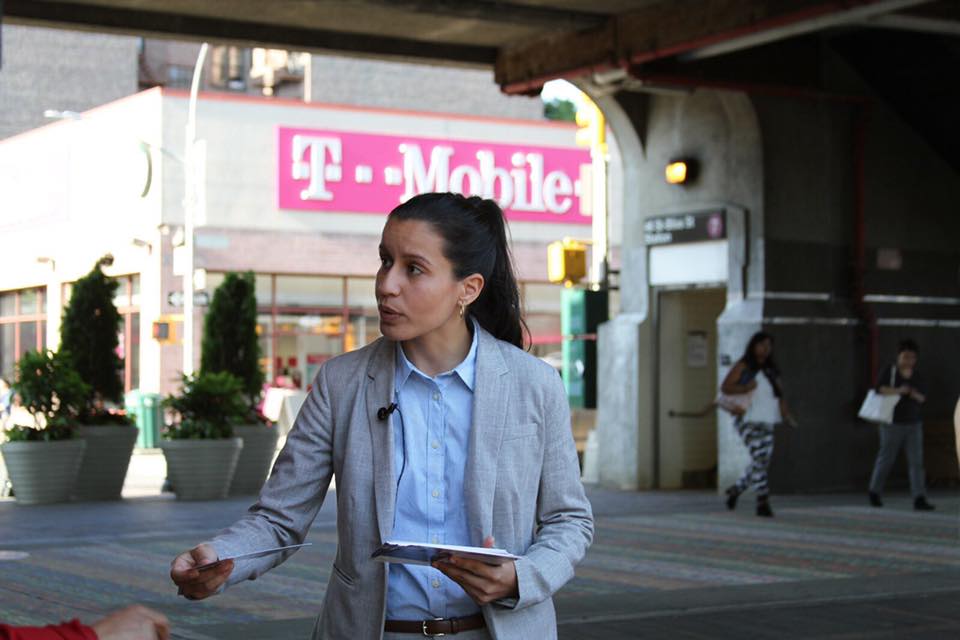Tiffany Cabán’s Success in Queens Shines Spotlight on Grassroots Organizing
New Yorkers voted in their DA primaries last week.
Daniel Nichanian | July 2, 2019


This article originally appeared on The Appeal, which hosted The Political Report project.
Shortly after announcing a candidacy for district attorney of Queens, public defender Tiffany Cabán attended a rally demanding reform from the DA’s office. “If I weren’t running, I’d be up there with a sign,” she told the Queens Daily Eagle. “We need to hear the community’s voices and that’s the approach the DA’s office needs to be taking.”
Cabán claimed victory in the Democratic primary on Election Night last week. As of publication, she leads Queens Borough President Melinda Katz by 1,199 votes, with approximately 6,300 ballots left to be counted. If she retains her lead, she would be favored to win the general election in this heavily Democratic county.
Cabán, who has said she would be a “decarceral prosecutor,” is far from the first candidate to run on ending mass incarceration. But she has uncommonly centered her candidacy on the voices of those most affected by the problems of the criminal legal system. “Our policies should be coming from community members that are directly impacted by them,” she told The Appeal in February.
She said this in the context of explaining her support for fully decriminalizing sex work, a stance staked by few if any of the “progressive prosecutors” elected in recent years. In a press release issued last week, Decrim NY, a coalition of groups working for decriminalization, praised Cabán for her “consistent, vocal uplifting of the voices of people who trade sex, so often excluded in her mainstream media.” Cabán even elevated decriminalization into an issue in the presidential race.
“We are not there to police bodies and take away folks’ autonomy,” she told BuzzFeed. Writing in the New Republic, Melissa Gira Grant places Cabán’s campaign in the legacy of organizations like INCITE and Survived & Punished, “which have long called for alternatives to policing and prosecution to keep communities safe.”
Indeed, a core aspect of Cabán’s bid has been her advocacy for altogether shrinking the criminal legal system, rather than just prosecuting differently. The very first commitment on her website’s issues page is to “prosecute less.” She has promised to write a memo to her staff “on day one” instructing them to “not prosecute sex workers, customers,” and to “not prosecute under the promoting prostitution charges.” She also says she would decline to prosecute other charges, including recreational drug use. Cabán also said she would create a conviction review unit; Queens is the only New York City borough to lack one.
Such decarcerative policies could impact the future of jail space in New York City. DAs have no direct say on Mayor Bill de Blasio’s proposal to replace Rikers Island with new borough-based jails, but a drop in the incarcerated population in Queens could pressure city officials to design facilities with less capacity, as discussed in the Political Report’s June roundtable.
This race gets portrayed as a redo of last summer’s congressional primary between Joe Crowley and Alexandria Ocasio-Cortez: Democratic establishment versus left insurgency. It’s true that some battlelines were similar. Crowley, the local Democratic Party, and Governor Andrew Cuomo endorsed Katz; Ocasio-Cortez and the city’s Democratic Socialists of America chapter backed Cabán.
But Cabán also received some prominent support, including the New York Times’s, testifying to the political terrain’s continued shift on criminal justice reform.
That characterization can also overlook that Cabán’s focus on decarceration enabled her to tap into New York’s substantial activism to overhaul the criminal legal system. “The crisis of mass incarceration and criminalization has personally impacted so many of us, and as a result, we know that jails and prisons are not the remedy to problems caused by underinvestment and structural racism” Erin George, the criminal justice campaigns director of Citizen Action of New York, a group that endorsed Caban, told the Political Report. “The enormous grassroots energy and activism around Tiffany Caban’s campaign comes from regular people understanding that this system is doing irreparable harm.”
David Brand, an editor at the Queens Daily Eagle, characterized the election similarly in the Political Report’s roundtable on the election. “It’s about the movement of people on the ground who delivered” Occasio-Cortez’s win, he said. “There’s such a powerful grassroots movement of organizations that have been advocating for justice reform and amplifying the voices of people who are incarcerated, or people, communities of color who are experiencing overpolicing.”
St. Louis County saw this same interplay between grassroots voices and local politics last year, when voters ousted Prosecuting Attorney Bob McCulloch four years after the Ferguson protests.
“People who are impacted know it’s not just their stories, but rarely do they get to tell their story, and rarely do people care enough to listen to their story,” Reverend Dr. Cassandra Gould, the executive director of Missouri Faith Voices, told the Political Report in December about her organization’s work in the St. Louis election. “Using their voice and engaging in a democratic process, it’s also a way to lift their voice. We were able to connect the story of their pain to their opportunity to make something different happen, as opposed to keeping it to yourself but not ever bringing it to light.”
If she retains her lead over Katz, Cabán would face Republican Daniel Kogan, an attorney, in November’s general election. But Kogan has yet to decide whether he will actually campaign, and the Eagle reported that the GOP may still maneuver to replace him with a more prominent candidate.
Elsewhere in New York
There were other competitive DA primaries in New York last week, two of which in counties with more than 100,000 residents. These campaigns did not place mass incarceration at the forefront as in Queens, however.
Thomas Walsh will likely be the new DA of Rockland County, north of New York City. A retired judge, Walsh easily won a four-way Democratic primary in this open race; he will also appear on the ballot as the nominee of the Republican and Conservative parties. Assemblymember Kenneth Zebrowski, Walsh’s chief primary opponent, may still run in the general election for the Working Families Party; attorney Michael Diederich is running as an independent.
Walsh ran on creating a special unit to investigate financial crimes; he is emphasizing offenses like welfare or unemployment fraud rather than white-collar crimes. In a policy document on the opioid crisis, Walsh states that “we will not be able to arrest our way out of this epidemic” and promises “alternatives to incarceration,” but he also says he will prosecute all overdose deaths as a homicide, a practice that public health advocates have denounced as harmful. Walsh has also pledged to “combat wrongful convictions,” which would include creating a conviction review unit and reviewing all past convictions obtained based on uncorroborated evidence.
In Broome County, defense attorney Paul Battisti has a 137-vote lead over Michael Korchak, the chief assistant to the county’s retiring DA, in the GOP primary. (Approximately 600 absentee ballots remain to be counted.) The winner of this sharply negative race will face Democrat Debra Gelson, a trial attorney and former assistant DA, in the general election. Both Republicans ran on conventional tough-on-crime rhetoric. Battisti faulted the incumbent DA’s office for “lenient plea bargains” and promised “more aggressive prosecution.” Rejecting that characterization, Korchak touted his role in obtaining long sentences. “The DA’s job is not that of a social worker,” he said. Both candidates talked of diverting people with addiction issues to a drug court, but they did so while delineating implausibly bright lines between sellers and users.


